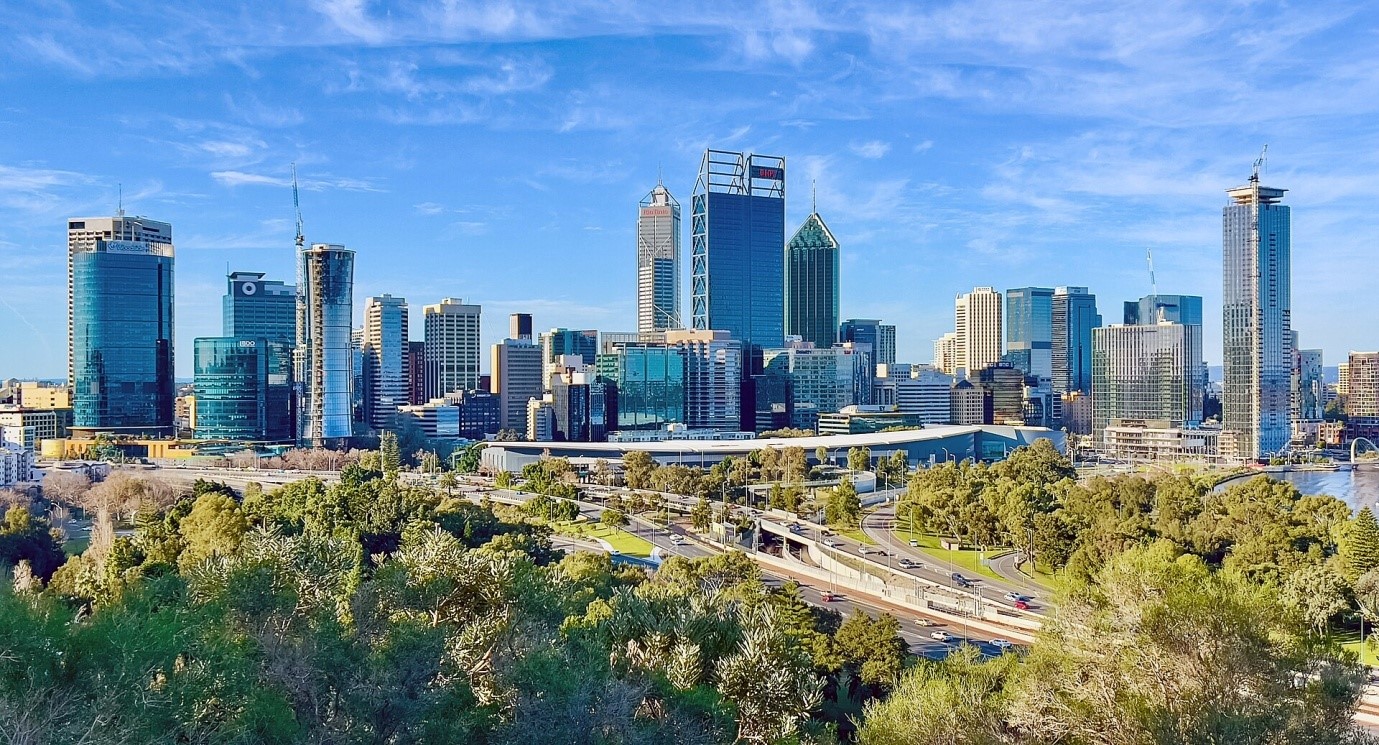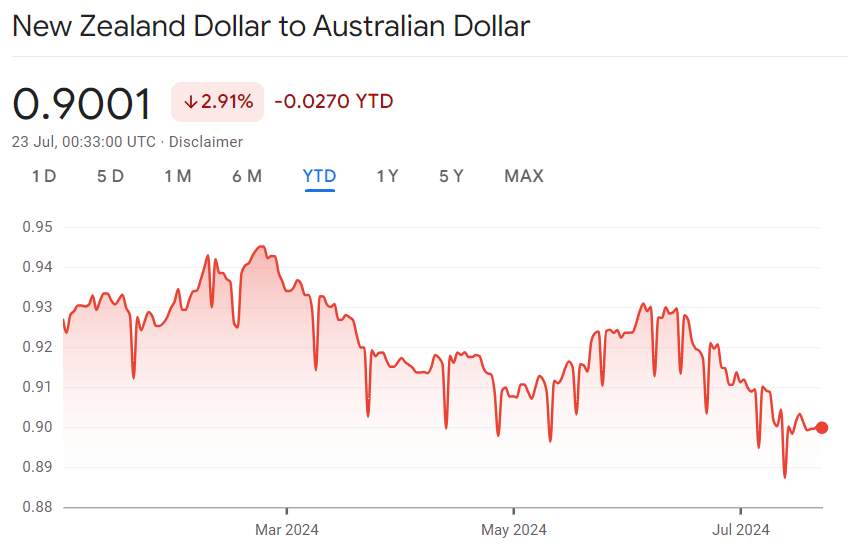I’m coming across more and more people leaving New Zealand.
Perth was the latest city on the radar. An Auckland family was able to increase their income by 50% and get on the housing ladder.

Perth fundamentals beckon. But the grass is not always greener. Source: Wikimedia Commons
Then there’s Britain. It remains popular for younger people looking for career opportunities.
Yet, when it comes to a country where you can build prosperity and have a quality lifestyle, it is still hard to beat New Zealand.
No capital gains tax
Media sings from the same leftward song sheet in this country. I can hear their repeat claims ringing in my ears. Our economy is held back by ‘an unfair tax system’.
No, for entrepreneurs and investors, the ability to build and compound capital makes this country attractive.
Let me give you the example of Brian (not his real name).
He built a big business in New Zealand. Then moved to Australia to grow his business in a larger market. But he found Australia very competitive. It was harder.
Then his New Zealand business got sold for a significant sum.
Now he faced a decision.
Remain in Australia and pay millions in capital gains tax. Or return to New Zealand and invest that money here.
For a small country, New Zealand has a vibrant and entrepreneurial business environment because it is still comparatively a good place to invest.
The mistake we’ve made is locking up too much money in the existing housing supply.
Had that gone into development or business, we might be in a better place.
For instance, 30% of Americans now own a stock portfolio worth more than USD $500,000. This wealth increase has come even as interest rates rise. That’s a big pool of liquid wealth set to multiply and drive even more opportunity.
Comparative freedom
Yes, freedoms have been eroded since the pandemic. While the last government could not get a mandate for much tax change, they did increase regulation. This has made it harder for enterprising people. It’s made it less attractive to be in business or farm food. That’s fuelled an inflation problem. The ensuing cost of living crisis has made life worse for many.
Compared to Australia or Britain, though, our regulatory and tax settings are still better on quite a few fronts.
When I was in Europe. I recall a colleague applying for a UK financial services license. The processing time was 12 months. In Australia, it costs AUD $597 to incorporate a standard company. Over $1,000 to register a 6-cylinder vehicle. More for a V8.
Australia has capital gains tax and stamp duty on property purchases. The UK has capital gains tax, stamp duty, and inheritance tax (charged at 40% above £325,000).
When I consider both options, New Zealand is a lot more investable.
For this reason, and despite all the current gloom, we should celebrate something. For a country of just 5 million in an isolated location, things are surprisingly good!

New Zealand: Top-10 millionaire maker over the past decade. Source: AI image generated by Freepik
From 2013 to 2023, we had a 48% increase in the local millionaire population, just behind the US (+62%), ahead of Australia (+35%), and Britain (–8%).
New Zealand is still free from many of the troubles that beset a country like Britain. When you tax capital as heavily as they do, wealthy people are motivated to leave. During my time in offshore finance, I saw plenty of this.
Instead, New Zealand is positioned to attract capital. To build businesses and grow wealth here. Then there’s a very good lifestyle.
- Quality food and arguably the world’s best value grass-fed beef
- Superb roasted coffee and the ability to dine out relatively cheaply.
- A mild, coastal climate that offers a perpetual Riviera lifestyle for much of the year.
- New and improved government that is at least trying to curtail waste and ideology.
Migrants outperforming
New Zealand attracts and selects skilled migrants, often with some capital. With a low birth rate and the pull of Australia, we need them.
While race relations aren’t perfect, my experience is things are much more harmonious here than in Europe. New Zealanders of all backgrounds get along. From those who have been here since the beginning. To those who have recently arrived.
In Europe, mass migration has arrived without choice, without selection, and often without capital. In marginalised towns, the tinder is dry.
New Zealand statistics show that our migrants deliver positive gains. They tend to generate more tax surplus than the average Kiwi. Some years back, research confirmed this:
‘The net fiscal impact per head was $2,680 for recent migrants, $3,470 for intermediate migrants and $4,280 for earlier migrants, while the comparable figure for the New Zealand-born population was $915 per head.’
Numbers in the US also show that migrants are 80% more likely to start a business and create jobs. It’s probably similar here.
Of course, we can’t take a positive story for granted. There are signs that the skill level of recent migrants has worsened. And there’s pressure on limited housing.
It’s about quality over quantity.
But we all know the Kiwi way of life and all the benefits it offers has been under threat for some years.
That’s due to economic management, not migration.
One key warning alert
I sit at a trading desk four nights a week for our wholesale clients.
Because New Zealand is a small economy, we believe diversifying into larger markets is important. Different countries. Different industries. Different stages of the economic cycle.
There are great opportunities in the coming cycle of global money moderation. But one significant hurdle right now is a very weak New Zealand dollar. This is a surprise.
Why? Our OCR is higher than Australia, Britain, or the EU. A higher central-bank rate would tend to support a stronger currency. This has not been the case here.

A steady decline of NZD against AUD this year. Source: Google Finance
Weak currencies can reflect poor economic fundamentals or systems of governance. Due to the monetary lag, the last several years of economic management are now being priced. They appear disastrous.
Despite a weak dollar, exports have been falling. In June 2024, one of the more positive months, goods exports fell by $7.4 million (0.1%) to $6.2 billion. Exports to China were down $142 million (9.1%).
Yes, there is a slowdown in China. But a vibrant business sector not hamstrung by regulation might have been better-placed to find new opportunities.
This suggests we have a lot of work to do. It’s not time to get distracted. It’s time to encourage more cranky bureaucrats to move to Melbourne, even as we welcome more savvy migrants to New Zealand and unleash Kiwi ingenuity.
We can do better. But New Zealand is still a good haven to build lasting prosperity from around the globe.
Are you looking to build and protect your wealth?
Here at Wealth Morning, we run a night-trading desk focused on global markets. We aim to build up defensive and income-rich portfolios for our Eligible and Wholesale Clients.
Have you previous experience in investing?
Are you a sophisticated investor?
Or have you built significant wealth?
All these characteristics could qualify you as an Eligible or Wholesale Investor for a managed account under our strategy. The assets remain in your name, and you retain full ownership and custody of your assets.
We are currently offering free consultations on this opportunity. I encourage you to reach out at this pivotal time.
You’ll always miss 100% of the shots you don’t take.
Regards,
Simon Angelo
Editor, Wealth Morning
(This article is the author’s personal opinion and commentary only. It is general in nature and should not be construed as any financial or investment advice. Wealth Morning offers Managed Account Services for Wholesale or Eligible investors as defined in the Financial Markets Conduct Act 2013.)





Simon is the Chief Executive Officer and Publisher at Wealth Morning. He has been investing in the markets since he was 17. He recently spent a couple of years working in the hedge-fund industry in Europe. Before this, he owned an award-winning professional-services business and online-learning company in Auckland for 20 years. He has completed the Certificate in Discretionary Investment Management from the Personal Finance Society (UK), has written a bestselling book, and manages global share portfolios.